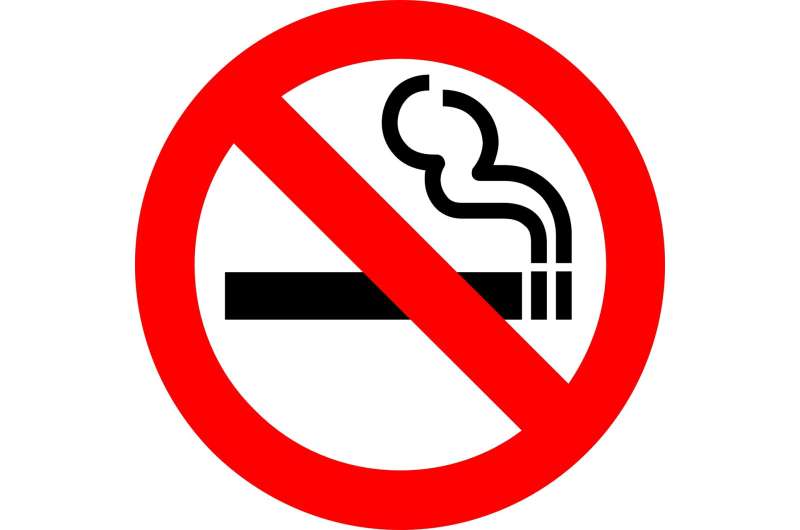This article has been reviewed according to Science X's editorial process and policies. Editors have highlighted the following attributes while ensuring the content's credibility:
fact-checked
peer-reviewed publication
trusted source
proofread
Researchers find behavioral economics strategies can help patients quit smoking after a cancer diagnosis

Researchers from Children's Hospital of Philadelphia (CHOP) and the Perelman School of Medicine at the University of Pennsylvania have found that cancer patients who continued to smoke after their diagnosis were significantly more likely to receive treatment for tobacco use when "nudges" to provide tobacco treatment were directed at clinicians through the electronic health record. The findings strengthen the case for using behavioral economics, or targeting predictable patterns in human decision-making to overcome barriers to changes in behavior, to improve outcomes for patients treated for cancer.
The findings were published online by the Journal of Clinical Oncology.
More than 50% of patients who smoke prior to their cancer diagnosis continue to smoke after they are diagnosed. This can worsen quality of life and accelerate tumor growth. Routine, evidence-based tobacco use treatment (TUT)—usually involving a referral to a smoking cessation clinic for counseling and potentially using medication to help address tobacco use—reduces the risk of death caused by cancer and other health issues. Despite its benefits, only about half of cancer centers identify patient tobacco use and even fewer engage patients directly in adopting a TUT strategy.
To help increase the use of TUT among cancer patients, researchers wanted to explore the use of strategies informed by behavioral economics to improve TUT uptake among patients and help clinicians improve their willingness to engage in TUT for their patients.
"Oncologists are faced with the challenge of responding to each patient's individual cancer, so we wanted to see if we could develop a strategy for making their lives as easy as possible by providing simple, timely nudges to help patients engage in tobacco use treatment options," said first author Brian Jenssen, MD, a researcher and primary care pediatrician with the Division of General Pediatrics at CHOP, a faculty member with PolicyLab and Clinical Futures at CHOP, a senior fellow at the Leonard Davis Institute of the University of Pennsylvania, and a member of the Abramson Cancer Center's Tobacco and Environmental Carcinogenesis Program. "Clinicians can help their patients find ways of improving their health by helping them quit smoking in a non-judgmental way."
In this study, conducted between June 2021 and July 2022, the researchers implemented a randomized clinical trial across 11 sites in the Penn Medicine Abramson Cancer Center (ACC) network. The research team designed and delivered electronic health record-based "nudges"—brief messages intended to remind clinicians and their patients to integrate tobacco treatment into their care plan—in four different combinations: patient only, clinician only, patient and clinician, and usual care with no nudges.
These nudges were designed to counteract mental biases that work against TUT, such as concerns about the safety of tobacco treatments versus their potential benefits, and the potential distraction from medical treatment. In total, 246 ACC clinicians were randomized in 95 clusters involving 2,146 eligible cancer patients who smoked while receiving cancer care.
The clinician nudge led to a significant increase in implementation of TUT compared with usual care (35.6% vs. 13.5%). Patient nudges did not impact implementation of TUT, suggesting that clinical staff are more effective targets to collaborate with their patients to adopt TUT strategies and that there is a need to continue to explore ways to improve patient-facing methods to increase TUT engagement.
"This study shows that a behavioral economics 'nudge' strategy can increase tobacco use treatment in the oncology setting, which we hope will help more patients with cancer control their tobacco dependence and enjoy better cancer care outcomes," said senior author Frank T. Leone, MD, director of the Comprehensive Smoking Treatment Program at Penn Medicine, a professor of Pulmonary Medicine in the Perelman School of Medicine, and a member of the Tobacco and Environmental Carcinogenesis Program at the ACC. "We look forward to continuing to build on this research and further increase engagement with tobacco use treatment in the oncology setting."
More information: Jenssen et al, A Cluster Randomized Pragmatic Clinical Trial Testing Behavioral Economic Implementation Strategies to Improve Tobacco Treatment for Cancer Patients Who Smoke, Journal of Clinical Oncology (2023). DOI: 10.1200/JCO.23.00355



















